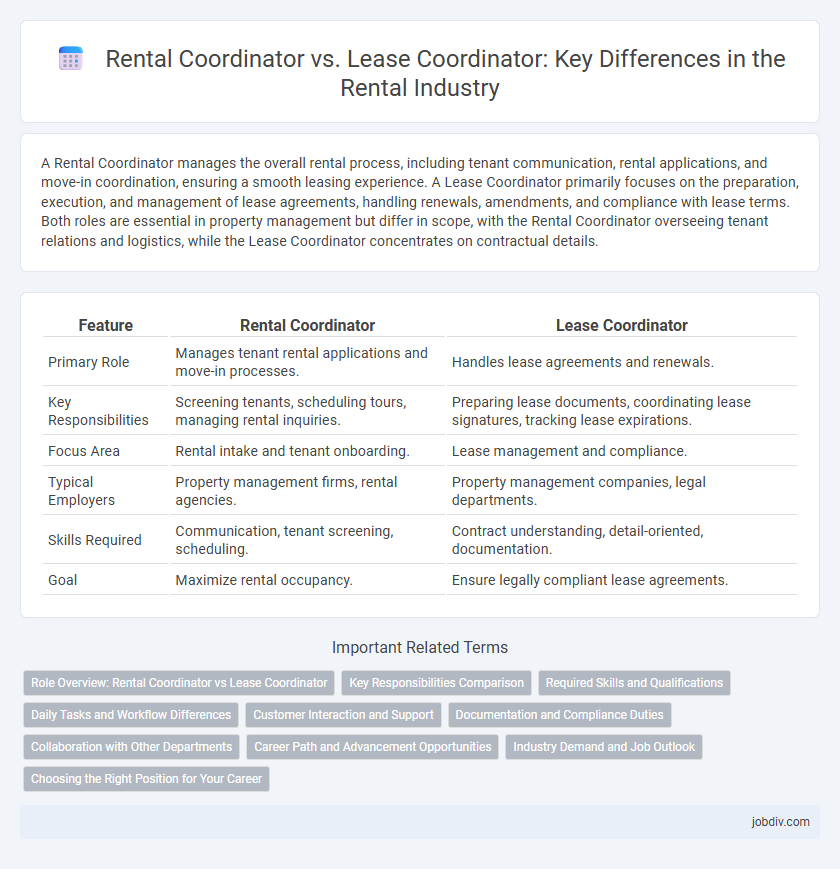A Rental Coordinator manages the overall rental process, including tenant communication, rental applications, and move-in coordination, ensuring a smooth leasing experience. A Lease Coordinator primarily focuses on the preparation, execution, and management of lease agreements, handling renewals, amendments, and compliance with lease terms. Both roles are essential in property management but differ in scope, with the Rental Coordinator overseeing tenant relations and logistics, while the Lease Coordinator concentrates on contractual details.
Table of Comparison
| Feature | Rental Coordinator | Lease Coordinator |
|---|---|---|
| Primary Role | Manages tenant rental applications and move-in processes. | Handles lease agreements and renewals. |
| Key Responsibilities | Screening tenants, scheduling tours, managing rental inquiries. | Preparing lease documents, coordinating lease signatures, tracking lease expirations. |
| Focus Area | Rental intake and tenant onboarding. | Lease management and compliance. |
| Typical Employers | Property management firms, rental agencies. | Property management companies, legal departments. |
| Skills Required | Communication, tenant screening, scheduling. | Contract understanding, detail-oriented, documentation. |
| Goal | Maximize rental occupancy. | Ensure legally compliant lease agreements. |
Role Overview: Rental Coordinator vs Lease Coordinator
Rental Coordinators manage tenant relations, coordinate property viewings, and handle rental applications to ensure efficient occupancy. Lease Coordinators focus on processing lease agreements, ensuring compliance with legal standards, and managing documentation throughout the lease term. Both roles streamline rental operations but differ in their primary focus on tenant acquisition versus lease administration.
Key Responsibilities Comparison
A Rental Coordinator manages tenant inquiries, processes rental applications, and coordinates property showings to ensure smooth leasing operations. A Lease Coordinator focuses on preparing, reviewing, and executing lease agreements while maintaining compliance with legal requirements and managing lease documentation. Both roles require strong communication skills and attention to detail but differ in their emphasis on tenant interaction versus lease contract administration.
Required Skills and Qualifications
Rental Coordinators must possess strong customer service skills, excellent communication abilities, and proficiency in property management software to efficiently handle tenant inquiries and coordinate property showings. Lease Coordinators require in-depth knowledge of lease agreements, legal compliance, and attention to detail to prepare, review, and manage leasing documents accurately. Both roles demand organizational skills, multitasking capabilities, and familiarity with rental market trends to support property management operations effectively.
Daily Tasks and Workflow Differences
A Rental Coordinator primarily manages tenant inquiries, processes rental applications, and coordinates property showings, ensuring timely communication between landlords and prospective renters. In contrast, a Lease Coordinator focuses on drafting, reviewing, and executing lease agreements, managing lease renewals, and maintaining compliance with housing regulations. Workflow differences include the Rental Coordinator emphasizing client interaction and property availability, while the Lease Coordinator handles legal documentation and contract administration.
Customer Interaction and Support
Rental Coordinators primarily manage tenant inquiries, schedule property showings, and facilitate communication between landlords and prospective renters to ensure a smooth rental process. Lease Coordinators focus on explaining lease terms, processing lease agreements, and addressing tenant concerns throughout the lease duration to maintain compliance and satisfaction. Both roles emphasize customer interaction and support but differ in their focus on initial rental coordination versus ongoing lease management.
Documentation and Compliance Duties
Rental Coordinators primarily manage tenant documentation, ensuring all rental agreements, applications, and identification are accurate and submitted on time to maintain compliance with housing regulations. Lease Coordinators focus on preparing and reviewing lease contracts, verifying legal terms, and coordinating necessary signatures to uphold lease compliance and mitigate risks. Both roles require meticulous attention to documentation standards, but Lease Coordinators emphasize legal lease adherence while Rental Coordinators handle broader tenant compliance records.
Collaboration with Other Departments
Rental Coordinators collaborate closely with marketing and maintenance teams to ensure timely property availability and accurate advertising. Lease Coordinators work directly with legal and finance departments to streamline contract execution and payment processing. Both roles require coordinated communication to enhance tenant satisfaction and operational efficiency.
Career Path and Advancement Opportunities
Rental Coordinators primarily manage tenant communications and property maintenance scheduling, making their role integral for gaining experience in property management operations. Lease Coordinators focus on preparing and processing lease agreements, providing a strong foundation in legal documentation and contract management within the rental industry. Career advancement often leads Rental Coordinators toward property manager roles, while Lease Coordinators may progress into leasing manager or real estate compliance positions, emphasizing growth in operational leadership and regulatory expertise.
Industry Demand and Job Outlook
Rental Coordinators and Lease Coordinators play critical roles within the property management sector, with Rental Coordinators primarily managing tenant move-ins and move-outs while Lease Coordinators focus on lease documentation and compliance. The industry demand for Rental Coordinators is driven by increasing rental property developments and tenant turnover rates, whereas Lease Coordinators are sought after for their expertise in legal lease administration amid growing regulatory complexities. Job outlook projections indicate steady growth for both positions, fueled by expanding rental markets and the need for efficient lease management to ensure tenant satisfaction and property profitability.
Choosing the Right Position for Your Career
Choosing between a Rental Coordinator and a Lease Coordinator depends on your career goals and skill set. Rental Coordinators typically manage property showings, handle inquiries, and assist with tenant screening, emphasizing customer service and operational support. Lease Coordinators focus on preparing lease agreements, ensuring compliance, and coordinating lease renewals, requiring strong attention to detail and legal knowledge, making the choice crucial based on whether you prefer client interaction or administrative precision.
Rental Coordinator vs Lease Coordinator Infographic

 jobdiv.com
jobdiv.com